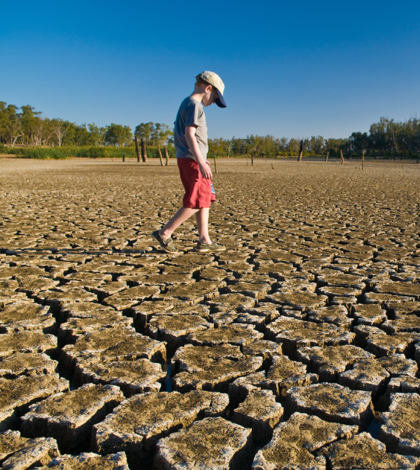Thanks to the Robert Wood Johnson Foundation researchers at the University of California, Riverside (UCR) will be able to begin a study to determine whether drought and adverse weather conditions cause health problems, and whether water policy effects the link between extreme temperatures and health.
The Foundation’s Evidence for Action Program has awarded $284,680 to UCR fir the study. Whereas the research will focus on California, it is relevant to many regions in the United States and the world who also experience similar weather conditions – drought, aridity and water scarcity.
The two-year study — “Overlooked Health Implications of Water Policy during Drought and Extreme Temperature Events,” — will be led by Principal Investigator Kurt Schwabe, UCR professor of environmental economics and policy. Schwabe is known internationally for his research on economic issues associated with water use, agricultural production, urban water conservation, ecosystem services and environmental regulation.
Assisting Schwabe with the study are Co-Principal Investigators Bruce Link, distinguished professor of public policy and sociology, and Mindy Marks, a formerly UCR professor of public policy and economics and now a professor of economics at Northeastern University in Boston. Also part of the research team is M. Kate Choi, a UCR alumna and now adjunct professor at the Keck Graduate Institute at The Claremont Colleges.
Analyses examining the influences adverse and extreme weather events are few and have previously concentrated on the people in developing countries, according to Schwabe. Should California’s on-going drought negatively impact the state’s residents Schwabe’s will make that information available to California policymakers.
“When drought strikes, water policy often dictates where and to what degree water supply deliveries are curtailed. Water policymakers seek and regularly receive evidence that is relevant to diverse sectors including agriculture, the environment and municipal needs, but rarely health,” explained Kurt Schwabe, professor of environmental economics and policy and principal investigator on the project. “One reason for this neglect is that policymakers have not had evidence for action about the connections among drought and extreme temperature, water policy and health.”
Schwabe said the team will use 20 years of health data gathered by the California Office of Statewide Health Planning and Development and California Health Interview Surveys, as well as county-level water-policy measures and drought indices, and develop a unique data set that will allow a thorough and precise evaluation of health impacts of restricted water deliveries. They will focus on the possible impact of drought-influenced water-delivery on the health of California’s poorest regions. Included in the health measures to be studied are: self-rated health, emotional distress, binge drinking, infant birth weight and mortality, and the possible disproportionate impact on vulnerable communities.
California’s drought and extreme temperature in 2015 resulted in agriculture losses that led to the loss of approximately 10,000 seasonal jobs and statewide economic loss of approximately $2.7 billion.
“These statewide economic estimates may inadequately capture the overall impacts of adverse weather events by overlooking the related health effects that likely fall upon very vulnerable communities within the poorest regions of California,” he said. “The impacts of drought and extreme temperature on these communities, often disproportionately immigrant and Hispanic, can be severe. The stress, anxiety, and reduced income and job losses that occur within these communities likely result in health effects.”
Adverse health consequences from drought is key not only for directing water policy so as to minimize the harm adverse weather events create, but also for social policies that influence housing, jobs, schools, and the availability of nutritious food to those most deeply affected, Schwabe added.
“Our objective is to open the possibility for a new era of water policy that considers the health consequences of drought and extreme temperatures alongside other impacts in their development of wise and equitable plans for the distribution of scarce water resources and associated investments,” he said.
The health consequences of natural and manmade disasters have been extensively studied for decades, continued Schwabe. “Evidence documents that when these calamities strike, population health suffers. We will study drought as a ‘slow’ disaster that, while less dramatic in its onset, might have equally potent effects on population health. It represents a critically important but understudied form of disaster.”
 California Water News Daily Your Source For Water News in California
California Water News Daily Your Source For Water News in California


